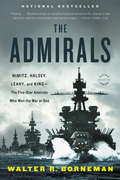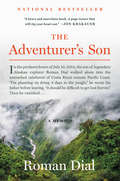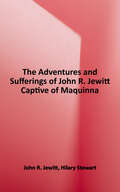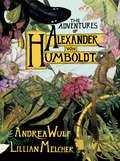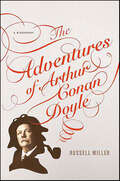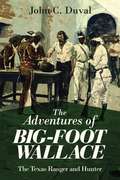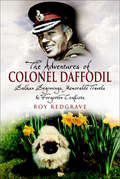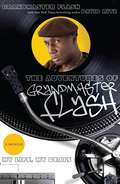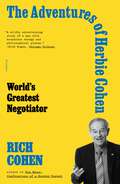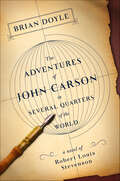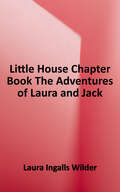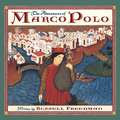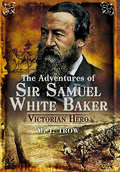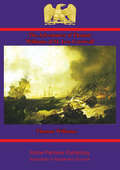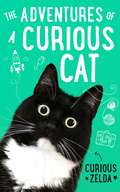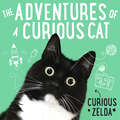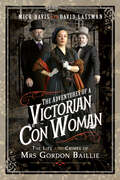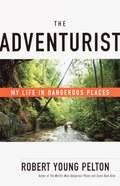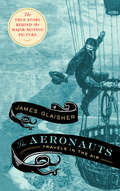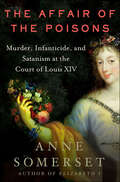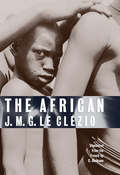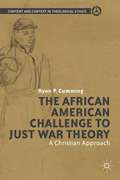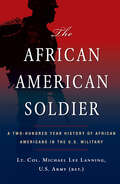- Table View
- List View
The Admirals: Nimitz, Halsey, Leahy, and King--The Five-Star Admirals Who Won the War at Sea
by Walter R. BornemanHow history's only five-star admirals triumphed in World War II and made the United States the world's dominant sea power. Only four men in American history have been promoted to the five-star rank of Admiral of the Fleet: William Leahy, Ernest King, Chester Nimitz, and William Halsey. These four men were the best and the brightest the navy produced, and together they led the U. S. navy to victory in World War II, establishing the United States as the world's greatest fleet. In THE ADMIRALS, award-winning historian Walter R. Borneman tells their story in full detail for the first time. Drawing upon journals, ship logs, and other primary sources, he brings an incredible historical moment to life, showing us how the four admirals revolutionized naval warfare forever with submarines and aircraft carriers, and how these men-who were both friends and rivals-worked together to ensure that the Axis fleets lay destroyed on the ocean floor at the end of World War II.
The Adventurer's Son: A Memoir
by Roman Dial“A brave and marvelous book. A page-turner that will rip your heart out.” —Jon KrakauerIn the tradition of Into the Wild comes an instant classic of outdoor literature, a riveting work of uncommon depth: The Adventurer’s Son is Roman Dial’s extraordinary account of his two-year quest to unravel the mystery of his son’s fate.In the predawn hours of July 10, 2014, the twenty-seven-year-old son of preeminent Alaskan scientist and National Geographic Explorer Roman Dial, walked alone into Corcovado National Park, an untracked rainforest along Costa Rica’s remote Pacific Coast that shelters miners, poachers, and drug smugglers. He carried a light backpack and machete. Before he left, Cody Roman Dial emailed his father: “I am not sure how long it will take me, but I’m planning on doing 4 days in the jungle and a day to walk out. I’ll be bounded by a trail to the west and the coast everywhere else, so it should be difficult to get lost forever.”They were the last words Dial received from his son.As soon as he realized Cody Roman’s return date had passed, Dial set off for Costa Rica. As he trekked through the dense jungle, interviewing locals and searching for clues—the authorities suspected murder—the desperate father was forced to confront the deepest questions about himself and his own role in the events. Roman had raised his son to be fearless, to be at home in earth’s wildest places, travelling together through rugged Alaska to remote Borneo and Bhutan. Was he responsible for his son’s fate? Or, as he hoped, was Cody Roman safe and using his wilderness skills on a solo adventure from which he would emerge at any moment?Part detective story set in the most beautiful yet dangerous reaches of the planet, The Adventurer’s Son emerges as a far deeper tale of discovery—a journey to understand the truth about those we love the most. The Adventurer’s Son includes fifty black-and-white photographs.
The Adventures and Sufferings of John R. Jewitt, Captive of Maquinna
by Hilary Stewart John R. JewittThis new edition includes a full range of explanatory material, including annotations, numerous illustrations, and maps, as well as a comprehensive index. The text of the Narrative is taken from the 1851 Ithaca, New York, edition, and retains the original spelling and grammatical forms (including mistakes and typographical errors), as well as the nine rather quaint engravings. <p><p>This edition will give readers a new and thoughtful insight into the history of British Columbia and its indigenous people, and they will view this early nineteenth-century saga with a humanistic understanding and sensitivity so often lacking in the populace of the past.
The Adventures of Alexander Von Humboldt (Pantheon Graphic Library)
by Andrea WulfA KIRKUS REVIEWS BEST BOOK OF THE YEARFrom the New York Times bestselling author of The Invention of Nature, comes a breathtakingly illustrated and brilliantly evocative recounting of Alexander Von Humboldt's five year expedition in South America. Alexander von Humboldt (1769-1859) was an intrepid explorer and the most famous scientist of his age. His restless life was packed with adventure and discovery, but his most revolutionary idea was a radical vision of nature as a complex and interconnected global force that does not exist for the use of humankind alone. His theories and ideas were profoundly influenced by a five-year exploration of South America. Now Andrea Wulf partners with artist Lillian Melcher to bring this daring expedition to life, complete with excerpts from Humboldt's own diaries, atlases, and publications. She gives us an intimate portrait of the man who predicted human-induced climate change, fashioned poetic narrative out of scientific observation, and influenced iconic figures such as Simón Bolívar, Thomas Jefferson, Charles Darwin, and John Muir. This gorgeous account of the expedition not only shows how Humboldt honed his groundbreaking understanding of the natural world but also illuminates the man and his passions.
The Adventures of Arthur Conan Doyle: A Biography
by Russell MillerAs the creator of Sherlock Holmes, "the world's most famous man who never was," Arthur Conan Doyle remains one of our favorite writers; his work is read with affection—and sometimes obsession—the world over. Doctor, writer, spiritualist: his life was no less fascinating than his fiction. Conan Doyle grew up in relative poverty in Edinburgh, with the mental illness of his artistically gifted but alcoholic father casting a shadow over his early life. He struggled both as a young doctor and in his early attempts to sell short stories, having only limited success until Sherlock Holmes became a publishing phenomenon and propelled him to worldwide fame. While he enjoyed the celebrity Holmes brought him, he also felt that the stories damaged his literary reputation. Beyond his writing, Conan Doyle led a full life, participating in the Boer War, falling in love with another woman while his wife was dying of tuberculosis, campaigning against injustice, and converting to Spiritualism, a move that would bewilder his friends and fans. During his lifetime Conan Doyle wrote more than fifteen hundred letters to members of his family, most notably his mother, revealing his innermost thoughts, fears and hopes; and Russell Miller is the first biographer to have been granted unlimited access to Conan Doyle's private correspondence. The Adventures of Arthur Conan Doyle also makes use of the writer's personal papers, unseen for many years, and is the first book to draw fully on the Richard Lancelyn Green archive, the world's most comprehensive collection of Conan Doyle material. Told with panache, The Adventures of Arthur Conan Doyle is an unprecedentedly full portrait of an enduringly popular figure.
The Adventures of Big-Foot-Wallace: The Texas Ranger and Hunter
by John C. DuvallThe thrilling adventures of traveler, rancher, and fighter Big-Foot Wallace in a bygone era of the American frontier. Amid the embroiling conflicts of frontiersmen, Mexicans, and war in Texas, 1837, William "Big-Foot" Wallace left his hometown of Virginia to avenge the deaths of his brother and cousin, soldiers executed by Mexicans. Upon joining the Texas Rangers, Wallace was swept into the clashes at Salado Creek, Hondo River, and the Battle of Monterrey during the Mexican-American War.Measuring at 6 feet 2 inches tall and weighing 240 pounds, Big-Foot Wallace embodied the iron nerves and indomitable spirit of the Texan frontiersman. In one of his most famous and harrowing experiences during the Mier Expedition, Wallace was captured by the Mexican Army, blindfolded, and forced to draw from a pot of black and white beans to determine whether he would be imprisoned or executed. Wallace drew a white bean and lived. After the war, he returned from the wilderness to clean, civilized Virginia, and spent the rest of his days as a storytelling, yarn-spinning rancher.John Duval, fellow Texas Ranger and Wallace's best friend, gives a thrilling but factual account of the man's life in a simple but engaging narrative style, combining action, suspense, and dry Texan humor. Wallace's hair-breadth escapes and larger-than-life story are the perfect representation of the Old West in all its perils, comedy, and romance.
The Adventures of Colonel Daffodil
by Roy RedgraveMajor General Sir Roy Redgrave has enjoyed an unusual, some might say eccentric, life. Born into the same family as the well known actors, he was brought up in Romania as part of a thriving international community before he joined the British Army and advanced to high rank.Following on from the success of his memoir Balkan Blue the author has pulled together a superb pot pourri of anecdotes covering his family, his military career and post-retirement travels and experiences. Readers will delight in the scope of this book which ranges widely from aristocratic life in feudal Romania to the dangers an intrigue of the Cold War; from the charm of French rural life to Franz Josef Land and encounters with polar bears, walruses and seals. We travel with this intrepid man from Kathmandu to Lhasa where he lived with impoverished Tibetans whose generosity and friendliness made the discomfort of primitive living at such altitudes disappear.These and other extraordinary experiences made this a fascinating read.
The Adventures of George Washington
by Margaret DavidsonThis is one of George Washington's big adventures. Christmas night 1776 - They are crossing the river to Trenton where the enemy army is.
The Adventures of Grandmaster Flash: My Life, My Beats
by David Ritz Grandmaster FlashA no-holds-barred memoir from the primary architect of hip hop and one of the culture's most revered music icons--both the tale of his life and legacy and a testament to dogged determination. Grandmaster Flash and the Furious Five fomented the musical revolution known as hip hop. Theirs was a groundbreaking union between one DJ and five rapping MCs. One of the first hip hop posses, they were responsible for such masterpieces as "The Message" and "Adventures of Grandmaster Flash on the Wheels of Steel. " In the 1970s Grandmaster Flash pioneered the art of break-beat DJing--the process of remixing and thereby creating a new piece of music by playing vinyl records and turntables as musical instruments. Disco-era DJs spun records so that people could dance. The original turntablist, Flash took it a step further by cutting, rubbing, backspinning, and mixing records, focusing on "breaks"--what Flash described as "the short, climactic parts of the records that really grabbed me"--as a way of heightening musical excitement and creating something new. Now the man who paved the way for such artists as Jay-Z, Sean "P. Diddy" Combs, and 50 Cent tells all--from his early days on the mean streets of the South Bronx, to the heights of hip hop stardom, losing millions at the hands of his record label, his downward spiral into cocaine addiction, and his ultimate redemption with the help and love of his family and friends. In this powerful memoir, Flash recounts how music from the streets, much like rock 'n' roll a generation before, became the sound of an era and swept a nation with its funk, flavor, and beat.
The Adventures of Herbie Cohen: World's Greatest Negotiator
by Rich CohenThe New York Times bestselling author Rich Cohen tells the story of Herbie: the king of Bensonhurst, the world’s best negotiator—and Cohen’s wise, wisecracking father.Meet Herbie Cohen, World’s Greatest Negotiator, dealmaker, risk taker, raconteur, adviser to presidents and corporations, hostage and arms negotiator, lesson giver and justice seeker, author of the how-to business classic You Can Negotiate Anything. And, of course, Rich Cohen’s father. The Adventures of Herbie Cohen follows our hero from his youth spent running around Brooklyn with his pals Sandy Koufax, Larry King, Who Ha, Inky, and Ben the Worrier (many of them members of his Bensonhurst gang, “the Warriors”); to his days coaching basketball in the army in Europe; to his years as a devoted and unconventional husband, father, and freelance guru crossing the country to give lectures, settle disputes, and hone the art of success while finding meaning in this strange, funny world.This book is an ode to a remarkable man by an adoring but not undiscerning son, and a treasure trove of hilarious antics and counterintuitive wisdom. (Some of this stuff you can use at home.) It’s a bildungsroman, a collection of tall tales, the unfolding of a unique biography coiled around Herbie’s great insight and guiding principle: The secret of life is to care, but not that much.Includes black-and-white photographs
The Adventures of John Carson in Several Quarters of the World: A Novel of Robert Louis Stevenson
by Brian Doyle“An affectionate homage,” this novel of Stevenson’s evolution into an adventure writer is “a loving reconstruction of an era of storytelling now lost” (New York Times).The young Robert Louis Stevenson, living in a boarding house in San Francisco in the nineteenth century while waiting for his beloved’s divorce from her feckless husband, dreamed of writing a soaring novel about his landlady’s adventurous and globe-trotting husband, John Carson—but he never got around to it. And very soon thereafter he was married, headed home to Scotland, and on his way to becoming the most famous novelist in the world, after writing such classics as Treasure Island, The Strange Case of Dr. Jekyll and Mr. Hyde, and Kidnapped.But now Brian Doyle brings Stevenson’s untold tale to life, braiding the adventures of seaman John Carson with those of a young Stevenson, wandering the streets of San Francisco, gathering material for his fiction, and yearning for his beloved across the bay. An adventure tale, an elegy to one of the greatest writers of our language, a time-traveling plunge into The City by the Bay during its own energetic youth, The Adventures of John Carson in Several Quarters of the World is entertaining, poignant, and sensual.“[A] triumph.” —Washington Post“Rich prose and a unique perspective on one of the world’s most beloved authors.” —Publishers Weekly“A tale of bounding energy with a delicate touch, driving always towards the beautiful and the true.” —Helen Garner, author of The Spare Room“[A] tender, affectionate, and terribly fun homage to the joys of storytelling and storytellers.” —Kirkus Reviews
The Adventures of Laura and Jack (Little House Chapter Book)
by Laura Ingalls WilderThe story of Laura and her loyal bulldog Jack is tailored to the youngest Little House readers and follows their special adventures together on the frontier.
The Adventures of Marco Polo
by Russell FreedmanWas he the world's greatest explorer? Or was he the world's biggest liar? Who was Marco Polo - a heroic explorer or a charlatan? The author shares Marco Polo's extraordinary tale with today's readers.
The Adventures of Sir Samuel White Baker: Victorian Hero
by M. J. TrowSir Samuel White Baker is one of those larger-than-life heroes only the Victorians could invent. For too long, the British Empire has been denigrated and equated with arrogance at best and racial bigotry at worst. Samuel Baker transcends that. He was an explorer and naturalist, recording new species on his many travels; a big game hunter with huge expertise across continents; an engineer of skill and ingenuity; a general of ability; an administrator second to none; and an ardent opponent of African slavery. M. J. Trow, in this the first biography of Baker for twenty years, draws heavily on Bakers prolific writings to bring the extraordinary character of this Victorian adventurer and his achievements to life.
The Adventures of Thomas Williams of St. Ives, Cornwall: A Prisoner Of War In France, 1804-1814 (1901)
by Thomas WilliamsThis ebook is purpose built and is proof-read and re-type set from the original to provide an outstanding experience of reflowing text for an ebook reader. An oft-forgotten number of British sailors, soldiers and merchantmen were taken prisoner during the long years of the Napoleonic Wars. Ranging from men such as Captain Moyle Sherer, who was captured in 1813, suffering less than a year of imprisonment, to Thomas Williams, who was captured only a year into the conflict. Thomas Williams was a sailor on a merchant ship and was captured after his ship lost its convoy en route to England. Williams left his memoir of his ten years in French captivity: ranging from mistreatment at the hands of his captors to his numerous escape attempts and the various characters he fell in with. A witty reminiscence on what was clearly a dark time for him, enlivened by a good sense of humour. Title - The Adventures of Thomas Williams of St. Ives, Cornwall Sub-Title - Who was a Prisoner of War in France from March 1804 to May 1814. Author -- Thomas Williams (1787-1862) Text taken, whole and complete, from the edition published in 1901, London, by Brentford Printing & Publishing Co. Original - 88 pages. Illustrations -- 3 Illustrations.
The Adventures of a Curious Cat: wit and wisdom from Curious Zelda, purrfect for cats and their humans
by Curious Zelda'A purrfect gift for a loved one with a special affinity for the feline' 'An absolute must for any cat lover''Curiosity is more than a desire to discover. It's a lifestyle, and a purrvilege. It's hours of observing a fly on the wall. It's entering the sock drawer just before it closes. It's sniffing the lampshade one more time . . .'Such is the wisdom of Curious Zelda: social media star, agony aunt, yoga teacher, cat. In The Adventures of a Curious Cat she gives insight into her view of the world and dispenses unparalleled wisdom. Zelda explains, in her unique voice, how to handle humans, how to communicate with furniture, and most importantly how to live a life curiously. It's the ultimate self-help guide for any cat, or indeed, their human.
The Adventures of a Curious Cat: wit and wisdom from Curious Zelda, purrfect for cats and their humans
by Curious Zelda'A purrfect gift for a loved one with a special affinity for the feline''An absolute must for any cat lover''Curiosity is more than a desire to discover. It's a lifestyle, and a purrvilege. It's hours of observing a fly on the wall. It's entering the sock drawer just before it closes. It's sniffing the lampshade one more time . . .'Such is the wisdom of Curious Zelda: social media star, agony aunt, yoga teacher, cat. In The Adventures of a Curious Catshe gives insight into her view of the world and dispenses unparalleled wisdom. Zelda explains, in her unique voice, how to handle humans, how to communicate with furniture, and most importantly how to live a life curiously. It's the ultimate self-help guide for any cat, or indeed, their human.
The Adventures of a Curious Cat: wit and wisdom from Curious Zelda, purrfect for cats and their humans
by Curious Zelda'Curiosity is more than a desire to discover. It's a lifestyle, and a purrvilege. It's hours of observing a fly on the wall. It's entering the sock drawer just before it closes. It's sniffing the lampshade one more time . . .'Such is the wisdom of Curious Zelda: social media star, agony aunt, yoga teacher, cat. In The Adventures of a Curious Cat she gives insight into her view of the world and dispenses unparalleled wisdom. Zelda explains, in her unique voice, how to handle humans, how to communicate with furniture, and most importantly how to live a life curiously. It's the ultimate self-help guide for any cat, or indeed, their human.
The Adventures of a Victorian Con Woman: The Life and Crimes of Mrs Gordon Baillie
by David Lassman Mick DavisThe true crime story of a master swindler and charming con-artist who became one of the most notorious female criminals of the Victorian Age.‘The story of Mrs. Gordon Baillie is stranger than anything to be met with in the field of fiction.’Mrs. Gordon Baillie, known throughout her life as Annie, was born in the direst poverty in the small Scottish fishing town of Peterhead in 1848. Illegitimate and illiterate, her beauty and intelligence nevertheless enabled her to overcome her circumstances and become a charming and wealthy socialite living a life of luxury while raising money for worthy causes and charitable works.Behind her supposed perfect and contented life, however, lay one of the most notorious and compulsive swindlers of the Victorian Age. Her fraudulent fundraising and larger-than-life schemes played out across four decades and three continents, and involved land owners, crofters, aristocrats, politicians, bankers, socialist revolutionaries, operatic stars, and the cultural icons of the day.She became mistress to a rich aristocrat, married a world-renowned male opera singer and later took as a lover a vicar’s son with anarchist tendencies. For most of her ‘career’ she kept one step ahead of the law and her nemesis, Inspector Henry Marshall of Scotland Yard, but finally becoming undone through her own compulsion for petty theft, despite her amassed fortune.During her life she used more than forty aliases, produced four children and spent her way through millions in ill-gotten wealth. But at the turn of the twentieth century, her notoriety was such that she took refuge in America and disappeared from history.“If you want to read about a Victorian woman who was able to hide her humble origins in Scotland to become one of the most notorious con-women in well-to-do society—an audacious figure who tried to live the life she felt she deserved rather than the one society wanted her to lead—then this book is highly recommended.” —Criminal Historian, Dr Nell Darby
The Adventurist: My Life in Dangerous Places
by Robert Young PeltonThe Adventurist is one man's story, a story that will change the way you think about travel, survival, where you have been, and where you are going. Enter the world of Robert Young Pelton (if you dare), adventurer extraordinaire, author of Come Back Alive and The World's Most Dangerous Places (required reading at the CIA), and host of his TV series, Robert Young Pelton's The World's Most Dangerous Places. A breakneck autobiography, The Adventurist blasts across six continents and spans four decades of hard-core living with its dispatches of mayhem, adventure in exotic locales, survival against formidable odds, memories of the pivotal events, and memorable portraits of the people that have shaped Pelton's obsessive spirit. Be shelled with the Talibs on the front lines of Afghanistan; hang out with hit men and rebels in the Philippines; survive a plane crash in Borneo; narrowly escape a terrorist bombing in Africa; dance with headhunters in Sarawak; crew with pirates in the Sulu Sea; explore the events that led Pelton to his unusual calling (including how he honed his survival skills at "the toughest boys' school in North America"); and, perhaps most important, discover Pelton's secret mission--to understand the hearts and minds of the people he meets. The Adventurist is a real book about the real world, an inspirational read that takes you places you might never willingly go.
The Aeronauts: Travels in the Air
by James GlaisherThe True Story Behind the Major Motion Picture — and one of the greatest daredevil stories in the history of aviationIn 1862, ambitious scientist James Glaisher set out to do the impossible: ascend higher into the skies than ever before. A pioneer of weather forecasting and of photography, and a founding member of the Royal Meteorological Society, he wanted to take ground-breaking research measurements from different altitudes. On 5th September, along with experienced balloonist Henry Coxwell as his pilot, he lifted off in a hot air balloon for what would prove to be a death-defying and historic flight. Rising above the English countryside, they rose to the remarkable height of 37,000 feet (7 miles or 11km), almost killing both men, who experienced blurred vision, loss of motor function and, eventually, unconsciousness. It was a miracle they survived to tell the tale. Written in his own words, The Aeronauts chronicles Glaisher’s incredible flights and discoveries first hand, as well as his observations on those pioneers who came before and inspired him. His audaciously daring journey forms the story of the forthcoming major motion picture The Aeronauts. With an introduction by Professor Liz Bentley, Chief Executive at the Royal Meteorological Society
The Affair of the Poisons: Murder, Infanticide, and Satanism at the Court of Louis XIV
by Anne SomersetThe Affair of the Poisons, as it became known, was an extraordinary episode that took place in France during the reign of Louis XIV. When poisoning and black magic became widespread, arrests followed. Suspects included those among the highest ranks of society. Many were tortured and numerous executions resulted.The 1676 torture and execution of the Marquise de Brinvilliers marked the start of the scandal which rocked the foundations of French society and sent shock waves through all of Europe. Convicted of conspiring with her adulterous lover to poison her father and brothers in order to secure the family fortune, the marquise was the first member of the noble class to fall.In the French court of the period, where sexual affairs were numerous, ladies were not shy of seeking help from the murkier elements of the Parisian underworld, and fortune-tellers supplemented their dubious trade by selling poison.It was not long before the authorities were led to believe that Louis XIV himself was at risk. With the police chief of Paris police alerted, every hint of danger was investigated. Rumors abounded and it was not long before the King ordered the setting up of a special commission to investigate the poisonings and bring offenders to justice. No one, the King decreed, no matter how grand, would be spared having to account for their conduct.The royal court was soon thrown into disarray. The Mistress of the Robes and a distinguished general were among the early suspects. But they paled into insignificance when the King's mistress was incriminated. If, as was said, she had engaged in vile Satanic rituals and had sought to poison a rival for the King's affections, what was Louis XIV to do?Anne Somerset has gone back to original sources, letters and earlier accounts of the affair. By the end of her account, she reaches firm conclusions on various crucial matters. The Affair of the Poisons is an enthralling account of a sometimes bizarre period in French history.
The African
by J. M. G. Le ClézioThe African is a short autobiographical account of a pivotal moment in Nobel-Prize-winning author J. M. G. Le Clézio's childhood. In 1948, young Le Clézio, with his mother and brother, left behind a still-devastated Europe to join his father, a military doctor in Nigeria, from whom he'd been separated by the war. In Le Clézio's characteristically intimate, poetic voice, the narrative relates both the dazzled enthusiasm the child feels at discovering newfound freedom in the African savannah and his torment at discovering the rigid authoritarian nature of his father. The power and beauty of the book reside in the fact that both discoveries occur simultaneously.
The African American Challenge to Just War Theory
by Ryan P. CummingIn this innovative treatment of the ethics of war, Ryan P. Cumming brings classical sources of just war theory into conversation with African American voices. The result is a new direction in just war thought that challenges dominant interpretations of just war theory by looking to the perspectives of those on the underside of history and politics.
The African American Soldier: From Crispus Attucks to Colin Powell
by Lt. Col. Michael LanningMore than five thousand blacks joined the rebel Americans in the war as soldiers, sailors, and marines; many more supported the rebellion as laborers. Their service went largely unrecognized and unrecorded.Few letters, journals, or other narratives by blacks about the Revolution exist because whites had denied most African Americans an education. White historians of the period, and for years after the war, ignored the contributions and impact of thousands of blacks participants for several reasons. First of all, prejudices were so deeply ingrained that it did not even occur to most whites of the time that blacks had played a significant role either as individuals who fought or labored or as a segment of the population that affected decisions. Prejudices also prevented some who did witness the contributions of African Americans from honestly reporting that blacks could perform equally with whites on the battlefield if given the opportunity. Others did not mention blacks because of the difficulty of explaining why the United States kept half a million men, women, and children enslaved while fighting for independence and liberty." From Defenders of Liberty, by Lt. Col. Michael Lee Lanning (Ret.)
